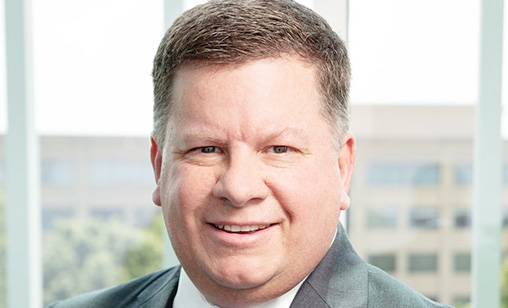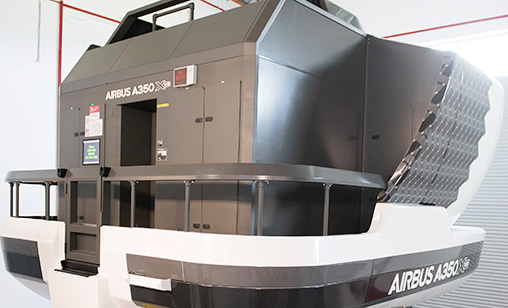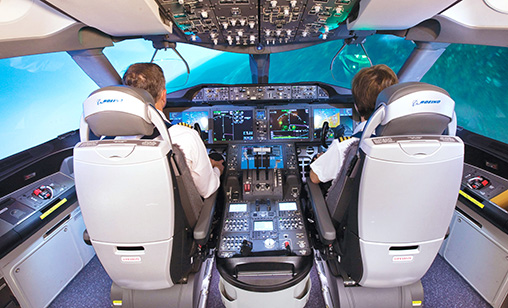Special Report: Training in the Asia-Pacific
Ab initio and desk top training programs essential to meet cockpit crew demand
Boeing and Airbus do not agree on everything, but when it comes to pilot training they are definitely in tune. After the pandemic hiatus, commercial aviation is in full recovery mode and heading for renewed growth. Associate editor and chief correspondent, Tom Ballantyne, reports.
April 1st 2023
Watch this space. Read More » That’s the message from Airbus head of training services, Maia Kuilenberg. While coy about the detail, she made it clear to Orient Aviation there will be announcements soon about the establishment of more pilot training facilities in the Asia-Pacific.
 |
 |
Kuilenberg explained Airbus, which operates ab initio flying academies in France and Mexico, has a clear intention to expand that network worldwide in the next five to ten years. “Nothing I can reveal today, but ab initio growth of our network is critical and will definitely happen. The Asia-Pacific is the next region we are looking at in that respect. We will see growth in India and we will support that in one way or another that you will discover soon,” she said.
Boeing too has an eye on expanding its training facilities in the region. “We are committed to serving our customers in the Asia-Pacific,” Commercial Training Solutions for Boeing Global Services vice president, Chris Broom, told Orient Aviation. “We are always evaluating needs and trends to see how we can best support our customers.
“With an estimated 31,000 pilots and 26,000 mechanics needed to support growing demand in South Asia, we anticipate strong training demand in India and are considering how best to serve our customers through a variety of means.”
Kuilenberg said Airbus intends to confirm its commitment to supporting the region and local authorities in expanding ab initio training. In February, the OEM signed a Memorandum of Understanding (MoU) with the Civil Aviation Flight University of China (CAFUC), the largest ab initio flight training institution globally, to jointly develop the first ab initio flight training standard in China. The initiative is a response to new flight training requirements issued by the Civil Aviation Administration of China (CAAC).
“Expanding its flight training footprint in China not only reflects the Airbus commitment to supporting the efficient and safe operation of all its aircraft, it also enables us to accompany our airline customers by anticipating and preparing for the future,” Airbus executive vice president and chief executive of Airbus China, Geroge Xu, said. In 2020, the CAAC launched a 10-year flight training reform program, Pilot Professionalism Lifecycle Management System (PLM), based on the Competency Based Training and Assessment (CBTA). This innovative training approach places a greater emphasis on a pilot’s ability to handle unexpected events. It integrates a deeper focus on non-technical skills compared with traditional flight training methods.
Under the MoU, Airbus will integrate its advanced training curriculum with the CBTA program alongside the CAFUC’s training experience and knowledge of China’s civil aviation operating conditions.
In 2022, Airbus successfully collaborated with Chinese airlines in an Evidence Based Training (EBT) program, devised from the CBTA concept, and has received positive feedback about it.
 |
Broom said “Boeing continues to partner with customers, governments and educational institutions to ensure the market is prepared to meet the unprecedented training demand predicted for the next two decades”.
“We anticipate demand to be 240,000 pilots, nearly 250,000 technicians and more than 345,000 cabin crew in this period. We are focused on how best to train in the early careers and ab initio spaces. We are implementing competency-based training and assessment in our curricula to enable our customers and others to provide high-quality early career training. Engraining CBTA in early career training will create a foundation of behavior competency to support professional training for those pursuing careers in all segments: commercial, business and rotorcraft. Third party pilot provisioning (contingent staffing) also continues to be a supplementary resource for carriers to maintain adequate staffing levels,” Broom said.
Both big plane makers have extensive training facilities across the Asia-Pacific. Boeing manages and operates five global training campuses, including training campuses in Singapore and Shanghai. It also has several airline training affiliations to serve customer needs, specifically in India and Korea.
Airbus has a simulator centre in Singapore, a joint venture with Singapore Airlines. It is the largest training campus in its global network. In February last year, it installed a fourth A350 simulator at the centre. It also has world class pilot and maintenance training centres in Delhi and Bangalore in India and in Beijing. Since 2018, it has had a training centre embedded in an aviation academy in Ho Chi Minh City in Vietnam and flight instructor services with Korean Air.
As for the recovery in the training market post-pandemic, both manufacturers have identified optimistic signs for the sector. “We have observed a very good recovery in the region so far with training needs expected to increase from 2024,” Kuilenberg said. .“This year, I would say is a year of transition so we expect growth from 2024.
“The future demand for pilots in the region will approach 42% to 45% of global demand in the next 20 years. That naturally leads to higher requests for processing of new pilots and training.
 |
“When we look at the workload in our training centres, we clearly have seen a decrease in the COVID years, probably about 23% to 25% in 2020. But we are almost back to pre-COVID times and will definitely be back in 2024. Already this year, our training centres are approaching 90% of occupancy [compared with pre-COVID].”
Broom said since the removal of regional travel restrictions the company is seeing an increase in demand for pilot and maintenance training in the Asia-Pacific and beyond. “It is important to remember we never stopped training during the pandemic,” he said.
“There was a decrease because of global travel restrictions, but our customers had to ensure pilots and technical staff were current with their training.”
Boeing Shanghai Training Campus general manager, Shawn Huang, added there has been a “moderate increase” in pilot training at the Shanghai campus.
Boeing Commercial Training Solutions senior manager Singapore & India, Pat Curtin, said since the pandemic eased there has been a steady increase in students training at Asia-Pacific campuses.
“In the region in 2022, we trained about 50% of students instructed at our campuses in 2019, which equals almost 1,500 students. As the aviation industry in Southeast Asia prioritizes recovery and growth, airlines in the region need to ensure they have adequate numbers of qualified pilots to fly their routes,” he said.
“We are witnessing a near-term increase in training services demand in Southeast Asia as crew transition to new aircraft types, maintain certification and return from pandemic-related pauses in active service.”
Clearly, the OEMs and other training providers will have to go all out to increase the cockpit crew population as the Asia-Pacific returns to the top of the global airline market in passengers carried. In Boeing’s 2022 Pilot and Technician Outlook, it analysed long-term market demand, fleet expansion, aircraft utilization, attrition rates and regional differences in crewing specific to aircraft type.
With the widespread warnings of pilot shortages, can training providers meet future demand? “We are preparing to do so,” Kuilenberg said. “The demand in the region, as we said earlier, will be about 42% to 45% of global demand so we are talking more than 150,000 pilots in the region in coming years.
“This is definitely a challenge. With all the existing capacity we have plus the growth of the ab initio network - because ab initio is definitely supporting future pilots - and the work we have launched in India where we want to accompany the growth of the country, I think it will be there in the years to come. All of this makes me quite confident we will be able to meet the demand.”
Eli says:
February 12th 2026 02:53am